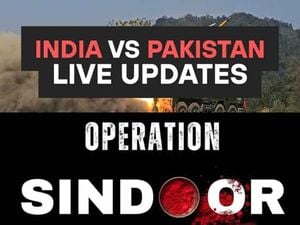In a significant escalation of military tensions between India and Pakistan, India has launched a series of retaliatory strikes targeting multiple military installations in Pakistan following drone attacks on Indian cities. This aggressive move comes in the wake of Pakistan's ongoing assaults on India's western borders, which have included the use of drones, long-range weapons, and fighter jets, according to Colonel Sofiya Qureshi of the Indian Army.
During a press briefing on May 10, 2025, Colonel Qureshi detailed how the Pakistani military attempted to infiltrate Indian airspace at over 26 locations, causing damage to equipment and personnel at key air force bases in Udhampur, Bhuj, Pathankot, and Bathinda. "They even used high-speed missiles at 1:04 AM to target Punjab's air base and attacked health facilities and schools," she stated, highlighting the severity of the situation.
In response, the Indian Air Force (IAF) conducted precision strikes on identified military targets, including command and control centers and weapon storage areas. Wing Commander Vyomika Singh elaborated on the operation, stating, "In a swift and calibrated response, Indian armed forces carried out a precision strike only at identified military targets. These included technical infrastructure, command and control centers, radar sites, and weapon storage areas." She confirmed that Pakistani military targets in Rafiqi, Murid, Chaklala, Rahim Yar Khan, Sukoor, and Chuniya were engaged using air-launched precision weapons from Indian fighter aircraft.
Moreover, Singh addressed the misinformation campaign being waged by Pakistan, which claimed the destruction of India's S-400 defense system and airfields at Surat and Sirsa. "India unequivocally rejects these false claims being spread by Pakistan," she added, underscoring the strategic communication battle accompanying the military confrontations.
Foreign Secretary Vikram Misri also weighed in, dismissing Pakistan's allegations regarding Indian strikes on Afghanistan as "frivolous" and reiterated that the Afghan people are well aware of the true aggressor in the region. He pointed out that the Pakistani military is trying to escalate tensions by moving forces to forward areas, which could further inflame the ongoing conflict.
In a related development, earlier in the week, India executed military strikes on nine terror camps located in Pakistan and Pakistan-occupied Kashmir (PoK) during a 25-minute operation. This operation, conducted on May 7, 2025, utilized both land and air strikes, emphasizing India's readiness to respond to any escalation from its western neighbor.
Foreign Secretary Misri referenced the April 22 Pahalgam terror attack, stating, "India exercised its right to respond, to pre-empt, and to deter further such cross-border attacks." He characterized the operations as measured, non-escalatory, and responsible, focusing on dismantling terrorist infrastructure and disabling groups that could threaten India.
Colonel Qureshi confirmed that no civilian targets or military installations were hit during the operation, which was executed between 1:05 AM and 1:30 AM. Wing Commander Singh stated that the Indian armed forces are fully prepared to respond to any Pakistani misadventures that could escalate the situation further.
Misri emphasized the urgency of these operations, noting that intelligence monitoring indicated further attacks against India were imminent. He specifically identified Pakistan-trained terrorists from the Lashkar-e-Taiba (LeT) as responsible for the Pahalgam attack, which aimed to undermine the return to normalcy in Jammu and Kashmir, particularly affecting tourism—a vital economic driver for the region.
The Foreign Secretary pointed out that a group calling itself "The Resistance Front" had claimed responsibility for the attack, which is recognized as a front for the Lashkar-e-Taiba. In his remarks, he mentioned that India had previously informed the UN's 1267 Sanctions Committee about this group, indicating its role as a cover for Pakistan-based terrorist organizations.
Misri highlighted the need for accountability, stating that the perpetrators and planners of the April 22 attack must be brought to justice. He noted that investigations into the attack have revealed communication notes from terrorists in Pakistan, further implicating the country in cross-border terrorism.
As tensions continue to rise, the Indian government remains vigilant, asserting that it will not hesitate to take necessary actions to protect its national security. The armed forces have demonstrated a clear commitment to responding decisively to any threats, while also engaging in a broader narrative to counter misinformation and uphold their strategic objectives.
With the stakes high and both nations on edge, the situation remains fluid. The international community watches closely as India and Pakistan navigate this precarious moment in their long-standing conflict, with both sides poised for potential further military engagements.




